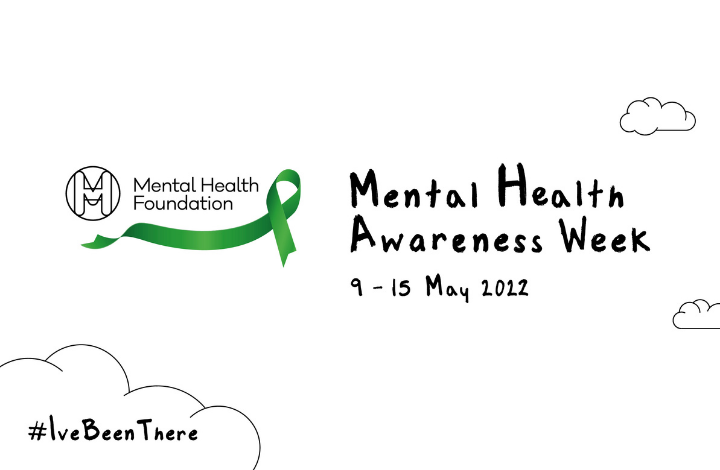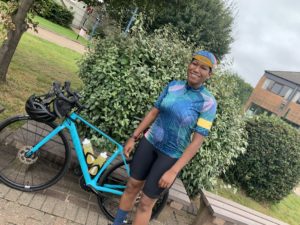Let’s talk about depression

This week marks Mental Health Awareness Week, and the theme is loneliness. I’m sure you’ve seen the statistic that one in four people will experience mental illness in their lifetime. But did you know that around 45% of adults in England experience loneliness? I want to share my experience of living with depression because it can be a lonely place. Some refer to it as the ‘Black Dog’, I refer to it as ‘The Funk’ – which sounds like a cool band.
INTRODUCING ‘THE FUNK’
I’ve had a diagnosis of depression since a young age, despite having the essentials – a loving and caring Mother, a roof over my head, food, stability, and more. Even with the diagnosis, medication, and therapy – I felt like I was in denial living my life in this weird grainy blur where it always rained, but I felt obliged to don my best smile. The problem with mental illness is that eventually it will catch up with you if you do not take action, and I know this first-hand.
Taking you back to the final year of my degree, I had a first-class pretty much secured, was elected as an officer within my Students’ Union, and I’d converted a gruelling summer internship at one of the world’s most elite investment banks into a graduate scheme offer. Generally, the future should have seemed bright, right?
However, it was genuinely one of my worst years on this planet. It wasn’t the pressure of final year, I worked hard to ensure I was set up for a successful career – I just frankly did not care anymore – my thinking was ‘what’s the point’. I couldn’t see the colour in life, let alone be happy about my achievements.
The symptoms of my depression had been bubbling, but I threw myself into an array of enrichment activities whilst working three jobs in my final year to avoid ‘the feeling’ of the way things felt.
In 2017 I gave medication another chance, I tried numerous anti-depressants and finally found one that worked for me. Side effects and experimentation aside, this helped me to move forward, but it doesn’t work for everyone. Stigma and cultural aspects are real considerations too.
I think the wildest thing about depression is the array of symptoms I’ve experienced including insomnia, lethargy, lack of concentration, recurring negative thinking and thoughts about self, feeling useless, questioning my place and contribution in the world, weight loss, weight gain and more.
FIGHTING THE GOOD FIGHT
In 2017 when I realised and accepted my mental health was holding me back, big time, I could no longer be in denial. I decided to take positive action and give myself a chance.
Here are a few things that have helped:
Cycling – I genuinely don’t know what I would do without this in my life. I’ve been cycling on London’s roads since young, but I gave it up during university. Fast forward to today, I have a road bike (and soon I’m getting a single speed). I’m a member of three clubs and I try my best to be consistent with training. I don’t always get it right, but when I do it does wonders for my mental health. It’s one of those rare things that helps me to get away from the general monotony of life, it allows me to detox digitally, shut off that internal monologue and just focus on the road, my surroundings, and my state of being.
Routine – This is so understated, having a solid routine has mostly kept me on track. When I plan, I know what’s coming up and I equally have things to look forward to, even if it’s chilling with a friend or tidying my living space. I think the hardest thing is maintaining a routine, I notice that my routine slowly peels away when I’m not feeling great, however, this becomes the trigger to take that step back, journal my thoughts, and establish a plan to move forward.
Life Coaching – I’m not a fan of therapy, I feel like I’m rubbish at it and I struggle to be consistent with attendance because it’s hard work to look inside yourself. However, getting a Life Coach has been a game-changer. Life coaching looks forward rather than backwards and enables me to bring my true self to the space, reflect, and grow. When you are young, things can seem so black and white, because you lack life experience and there is an aspect of naivety too, but as I’ve worked with my Coach I can see the grey a lot more in situations, I can apply better emotional intelligence to situations that challenge me and the growth has been immense.
A supportive workplace – Ketchum has a brilliant culture; open dialogue is at the heart of this. I genuinely feel that I can bring my true self to work, including days where I don’t feel so good (albeit I may be a bit anti-social on those days), but I have a good support network and a Senior Management team that cares, and this helps a lot! It’s not about being an expert, but just showing that you care makes a world of difference.

LOOKING AHEAD
The last few years have been an eye-opener for me and my progress, a former work colleague of mine who I had confided in said to me “you have depression, but it doesn’t define you”.
This statement rings true for me. Yes, it’s hard work keeping my head above water sometimes, but I’m equally determined to keep fighting the good fight, and that is what I shall continue to do.
Written by
Naomi MG Smith MCIPR (Account Manager, Corporate Reputation)
